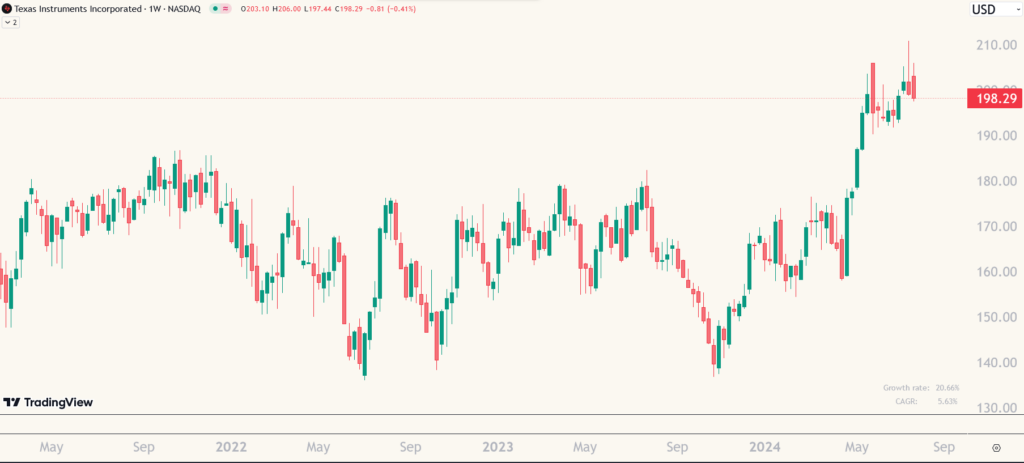Texas Instruments (NASDAQ: TXN) is set to report its Q2 earnings after the market close today. Analysts are anticipating declines in both revenue and profit as the company continues its aggressive investment strategy, which has recently sparked dissatisfaction among shareholders.
Positive note with Rosenblatt upgrade
The semiconductor giant started the week on a positive note with Rosenblatt Securities raising its target price for Texas Instruments from $210 to $250.
Analysts are optimistic that the company will meet its Q2 targets and project mid-single-digit growth going forward.
This upgrade comes as a welcome relief for investors, given the stock’s lackluster performance over the past few years.
Despite the upgrade, the stock has been trading sideways for over three years and has posted a modest 1-year return of just over 6%, which pales in comparison to the surging performance of other chip stocks driven by advancements in AI.

Shareholder discontent over high capex
The ongoing AI boom is presenting a once-in-a-generation opportunity for companies in the semiconductor space. Any mention of AI involvement often results in a stock price boost.
However, Texas Instruments has not reaped the same benefits, leading to frustration among its shareholders. The primary reason lies in its extensive capital expenditure (Capex) strategy.
Over the past three years, Texas Instruments has significantly increased its Capex spending.
Historically, Capex as a percentage of revenue remained in the single digits for the past 15 years. However, this figure jumped to 13% in 2021 and 14% in 2022.
In 2023, Capex surged to an astonishing 29%, causing concern among shareholders and industry analysts alike. While high Capex is not inherently problematic, the scale of Texas Instruments’ spending has raised eyebrows across the industry.
Elliott Investment Management’s stake and future outlook
Critics argue that the company’s expansion plans are overly ambitious, as it is building capacity nearly double the expected revenues over the next five years.
This excessive capacity is likely to remain underutilized, given current demand projections. Moreover, the company has not provided a clear roadmap on how this additional capacity will translate into improved cash flows in the future.
These concerns have prompted activist investor Elliott Investment Management to acquire a $2.5 billion stake in Texas Instruments. The upcoming earnings report is highly anticipated, not just for the company’s performance, but for its future guidance.
Texas Instruments is projected to allocate 32% of its revenues to Capex in 2024. With Elliott Investment now involved, investors are keen to see if the company will scale back this spending.
A reduction in Capex could signal a shift towards boosting revenues directly, which would likely be received positively by the market.
Investor hopes for strategic shift
Should Texas Instruments decide to cut Capex, it could result in a more bullish outlook, aligning with shareholder demands for short-term returns. This strategic shift might appease investors, who are currently eager for immediate gains. Whether this approach will translate into long-term success remains to be seen, but for now, the focus is on the short-term financial performance and guidance
The post Texas Instruments faces investor scrutiny amid high capex spending: What to expect in Q2 earnings appeared first on Invezz

